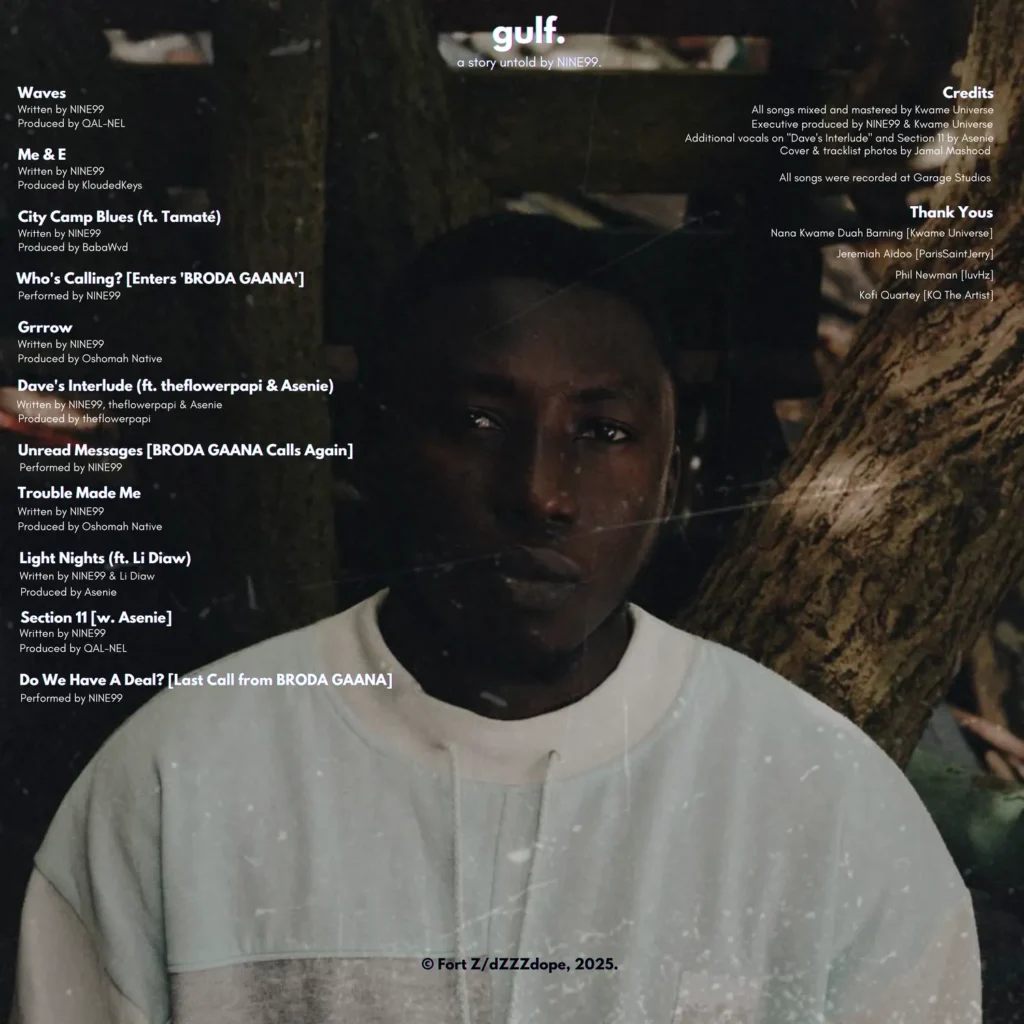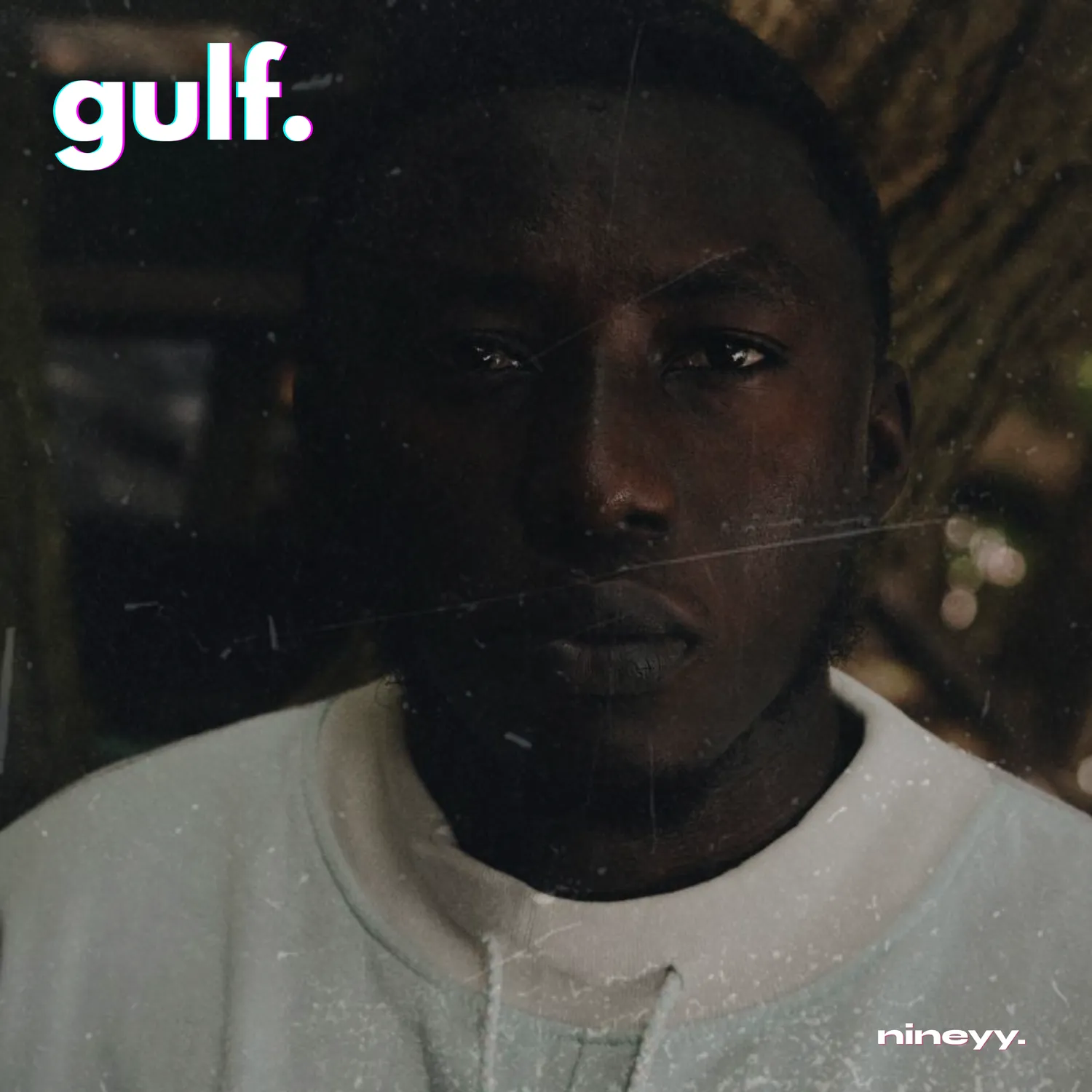For Ghanaian newcomer Nine99’s debut project Gulf, he takes us on a journey through what it means to be a young adult in today’s Accra—meditations on life as a young Ghanaian trying to understand his place in the world, making something of himself, and figure out his next steps. The anxieties, fears, and growth of this process are etched into every track, making Gulf a vulnerable and introspective offering.
The project opens with ambient vocals and synths that evoke both anxiety and calm—an intriguing contrast that sets the tone for the rest of the album. The tension here is palpable, but by the end, it becomes clear that while Nine99 may not know exactly how his future will pan out by the end, he’s confident it’ll all work out.
“Me & E” is a standout track, blending a retro hip-hop style with a modern rap-inspired production reminiscent of J. Cole or Mac Miller. Nine99 lets us know he’s fine with the choices he makes from here on out, regardless of what’s said about him or his path. He’s made peace with his decisions. It’s a moment of defiant self-assurance delivered with a cool confidence that feels earned rather than brash.
“City Camp Blues” peels back the layers, dropping some of the smooth confidence that came before. The bravado falters as the weight of reality settles in. He’s candid about the state of his life—the pressures, the uncertainties, and the haunting question of whether his plans will ever succeed. The anxiety here feels visceral, capturing the inner monologue of a dreamer struggling to keep it together.

The album is punctuated with voice mails from an enigmatic character known as Broda Gaana who seems undecided about signing him [Nine99]—an effective storytelling device that adds to the tension and uncertainty with a subtle comic edge. It feels like a glimpse into Nine99’s life, capturing the reality of navigating the industry while battling self-doubt.
“Grrrow” brings a burst of excitement as Nine99 braces himself for the next steps, eyes firmly set on growth despite the challenges he faces. It’s a bold, energetic push forward—an acknowledgment that he’s hungry for more.
This sentiment evolves in “Dave’s Interlude” which offers a deeper dive into Nine99’s psyche, with the vulnerable mantra: “I just want to be myself, I don’t want to lose myself.” It’s a sobering moment, highlighting the fear that the next phase of life could transform him into someone unrecognizable. He’s weighed down by the pressures of life, but resolve still burns in his voice.
The follow-up voice message from Broda Gaana, a character who seems to represent tough love, tries to keep his hopes up. There’s a hint of reassurance but also the pressure of expectations and a slight sense that he may just be leading Nine99 on.
“Trouble Made Me” marks a pivotal moment in the project. Nine99 confronts the harsh reality of his circumstances, fully embracing the struggle that made him who he is. The façade of positivity fades as he admits things aren’t great and haven’t been for a while, but he’s unrelenting in his pursuit of success—hoping that “these songs that I make” will be the key to rising above adversity.
At this point, there’s a tonal shift—Nine99 reaches out to powers greater than himself, chanting, “I be waiting in the day so that I can pray to the stars.” The intensity builds, signaling a readiness to step into his own power.
“Section 11” concludes the project as a hopeful tune where Nine99 fittingly assures us—but mostly himself—that he’s conquered his demons with lines like, “I’ve lived beyond my fears.” The track feels triumphant as he continues, “Hands to the heavens, I know my place is there.” It’s a self-affirmation of the highest order—an anthem in self-trust, belief in oneself, and faith in the process.
We’re sent off with a cheeky voice note from Broda Gaana, who unceremoniously dismisses Nine99, calling his talent (or lack thereof if Broda Gaana has anything to say about it) into question. But in a sly, confident manner, Nine99 lets us know he’s okay and still believes in the process. The track ends at 1:11—an intentional nod to numerology, where 111 signifies new beginnings, divine alignment, and a positive shift, encouraging trust in the universe and one’s intuition. Nine99 walks confidently into the next phase of his life.
The delivery throughout Gulf is mellow, with nothing too eccentric or loud. Nine99 seems like a chill guy sorting through existential meanderings, caught on the cusp of young adulthood, stepping out of college to face the big, wild world.
Western influences are evident in the production and melodies, making one wonder how distinguishable this would be from a project made in the United States. The occasional use of Ghanaian pidgin English and Twi phrases, however, ground the project in its origins. It raises a question: What does it mean to be a Ghanaian artist in a globalized world where culture skews increasingly toward Western ideals? Perhaps Gulf speaks to this new reality—where being Ghanaian isn’t about the instrumentation or local sounds but the perspective and lived experience of the artist.
Ultimately, Gulf is a strong introduction to Nine99’s world—a meditation on the journey of self-discovery and the complicated realities of young adulthood. It’s a confident yet reflective debut that hints at even more depth to come. We’re excited to see where Nine99’s journey takes him next.

